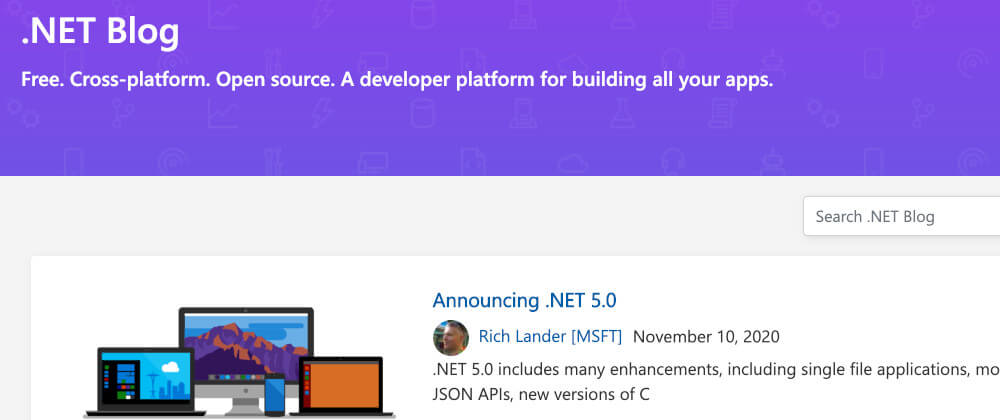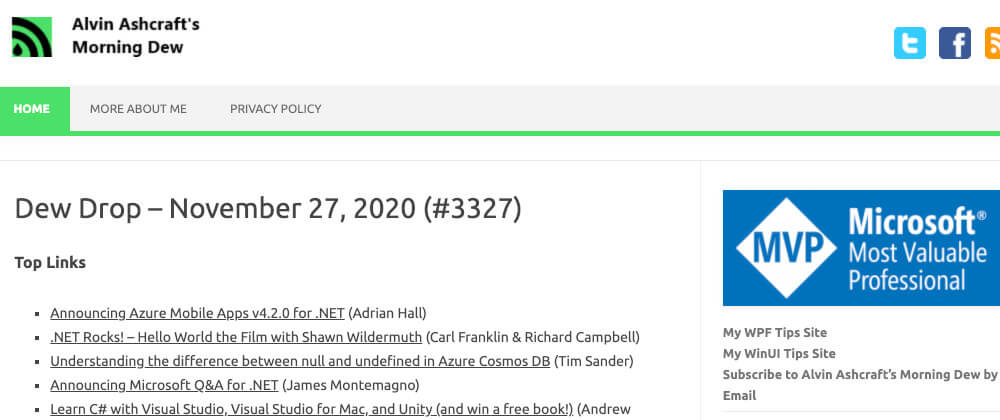Best 20 C# & .NET Blogs
Originally written for and published on the Draft.dev blog
C# is a language loved by its users for being versatile, productive, and keeping up with
the current problems programmers need to solve. For example, maintainers have added
functional programming concepts to the primarily imperative C# language, adding the powerful
query-functionality in LINQ, and smoother handling of asynchronous programming with the async / await-syntax.
The unification of all versions of .NET into .NET 5 has given C# and .NET future-safety,
no matter which platform you use to develop or which platform you develop for: desktop, web, cloud, mobile, or other.
Whether you’re getting into C# with the launch of .NET 5 or if you’re a long-time C# developer,
there are a lot of great blogs out there. Based on writing quality, consistency, longevity,
technical depth, and usefulness, I’ve put together this comprehensive list of the 20 best C# blogs publishing today.

Maybe a bit obvious, but the .NET blog from Microsoft should probably your first place to check
for new updates on C# and .NET. They consistently publish updates about everything related to C# and .NET
but also dives deep into different subjects, such as functionality deep within .NET or the details
about the performance improvements being made there.
- Writing Quality: 5
- Consistency: 5
- Longevity: 5
- Technical Depth: 5
- Broad Usefulness: 5

Sometimes, I’m unsure if you’re allowed to use .NET if you’re not reading Scott Hanselman’s blog.
There might be something in EULA about that. 😉
Jokes aside, Hanselman has been blogging about C# and .NET from the very start and has inspired
many people with the content on his blog, his conference-talks, his podcast, his YouTube-channel, and more.
He mixes high-level articles with some technical deep-dives, and his posts seem to be driven by his passion
for learning and solving problems.
Hanselman has become quite a household name in the .NET-world and is often featured in Microsoft’s keynotes.
This is well deserved, given his unparalleled professional approach to quality content, interesting topics,
and entertaining delivery.
- Writing Quality: 5
- Consistency: 5
- Longevity: 5
- Technical Depth: 5
- Broad Usefulness: 5

Steve Smith (aka Ardalis) is a strong proponent of producing content instead of consuming it,
which is quite obviously something he lives by when you look at his output. If you are a person
wanting to build your own brand, Steve is a role-model. He continually puts out qualitative information
on his blog, on Twitter, on Twitch, his newsletter, his Pluralsight-courses, and he now also is
building his own developer coaching-community.
Lately, Steve has been focusing on a lot of content around Domain-Driven Design (DDD) and the SOLID-principles.
Much of this can be found on his blog and on some great Pluralsight-courses.
- Writing Quality: 5
- Consistency: 5
- Longevity: 5
- Technical Depth: 5
- Broad Usefulness: 4

Want to see basically every new article the community puts out every single day? Well, then Alvin Ashcraft’s
Morning Dew has you covered when it comes to the subjects of C#, .NET, and the Microsoft-ecosystem.
Alvin Ashcraft is a longtime Microsoft MVP. From what you can tell from comments on his website,
Morning Dew is the result of Alvin reading through over 1,600 feeds daily. Any interesting articles found
are categorized and published on the blog.
- Writing Quality: N/A
- Consistency: 5
- Longevity: 5
- Technical Depth: N/A
- Broad Usefulness: 5

One of the most influential voices on the topic of security within the Microsoft-ecosystem is Troy Hunt.
He is the creator of the service Have I Been Pwned (HIBP), which helps users
identify if and how they’ve been affected by data breaches and other malicious activity on the internet.
Since Troy has Microsoft MVP for developer-security for a longer time, this is a subject that is often covered on his blog.
- Writing Quality: 5
- Consistency: 5
- Longevity: 5
- Technical Depth: 4
- Broad Usefulness: 3
Tim Heuer has worked at Microsoft since 2005, currently with a focus on .NET, Visual Studio, and Azure.
This gives him a lot of insight, which you can tell by the in-depth content and a great variety of technologies covered on his blog.
- Writing Quality: 5
- Consistency: 4
- Longevity: 5
- Technical Depth: 5
- Broad Usefulness: 4
Julie Lerman is the absolute authority on Entity Framework, including EF Core.
No matter if you’re looking for a detailed, low-level problem within EF, or if you’re looking for
a solid guide to walk you through various aspects of Entity Framework, there is a real chance that you’ll find
material around it produced by Julie Lerman.
- Writing Quality: 5
- Consistency: 4
- Longevity: 5
- Technical Depth: 5
- Broad Usefulness: 4
Phil Haack was an integral part of helping Microsoft make many of its development-software open-source,
along with Scott Hanselman, Scott Guthrie, and Rob Connery. Since then, Phil has moved on from Microsoft
but still consistently blogs about technologies in the Microsoft-ecosystem.
With his experience inside Microsoft during their exciting transformation, there is usually something interesting
for developers to learn in his posts.
- Writing Quality: 5
- Consistency: 4
- Longevity: 5
- Technical Depth: 4
- Broad Usefulness: 4
If you feel completely bulletproof in your coding-skills, go check out Mark Seemann’s blog and
get a glimpse of the endless things you could be doing better.
Writing good software is an art, so you can have endless opinions on other peoples’ opinions,
but there is almost always something new to learn from Mark’s deep-diving and well-thought-through posts.
Each article walks you through a complicated concept and helps you understand it and become a better developer
who writes better, more maintainable code.
- Writing Quality: 5
- Consistency: 5
- Longevity: 5
- Technical Depth: 5
- Broad Usefulness: 3
Daniel Cazzulino (aka ‘kzu’) is the creator of the most popular mocking framework for C# and
.NET, called Moq, which is used for testing the source-code behind .NET.
Kzu writes about all different kinds of technologies related to the Microsoft-ecosystem and mixes
high-level guides with technical deep dives into non-mainstream topics.
- Writing Quality: 5
- Consistency: 4
- Longevity: 4
- Technical Depth: 5
- Broad Usefulness: 4
The blog for the Visual Studio Engineering Team, of course, covers everything related to Visual Studio,
but it also includes adjacent technologies, which can contribute to great inspiration. They cover topics
like Unity, Visual Studio for Mac, GitHub-integrations, debugging with memory-dumping, and much more.
For anyone interested in productivity in your Visual Studio-editor, it’s worth noting that
Mads Kristensen writes posts on the subject on the Visual Studio Blog.
- Writing Quality: 5
- Consistency: 5
- Longevity: 4
- Technical Depth: 4
- Broad Usefulness: 4
Maarten has a focus on web and cloud-apps, but he was also the founder of MyGet and
is a frequent speaker at conferences. He brings a unique mix of experiences and knowledge to his blog,
which covers many different technologies within the Microsoft-ecosystem.
- Writing Quality: 5
- Consistency: 4
- Longevity: 5
- Technical Depth: 4
- Broad Usefulness: 4
If you have ever searched for a C# question, there’s a 99% chance that you have, at least once,
landed on an answer on Stack Overflow by Jon Skeet.
He’s been the number one contributor to Stack Overflow for many years and usually with a focus
on .NET and C#. It is said that he’s read the whole C# specification (maybe more than once),
and he regularly blogs about some of the deepest subjects around C#.
- Writing Quality: 5
- Consistency: 4
- Longevity: 4
- Technical Depth: 5
- Broad Usefulness: 3
Jimmy is the man behind some of the most productivity-boosting frameworks for C# and .NET developers:
AutoMapper and MediatR. These frameworks help you write isolated and more easily maintainable code and
his blog-posts revolve around these frameworks, but also these topics in general.
- Writing Quality: 4
- Consistency: 4
- Longevity: 4
- Technical Depth: 5
- Broad Usefulness: 4
If you’ve worked with C# and .NET since its early days, especially with a focus on ASP.NET and the web,
you will most probably have run into more than one of Rick Strahl’s blog-posts.
In the course of working hands-on solving problems for clients, Rick has documented many solutions to
real-world problems on his blog. The topics often coincide with what other people are looking to answer,
so you can often find one of Rick’s articles linked in answers on Stack Overflow.
- Writing Quality: 4
- Consistency: 4
- Longevity: 5
- Technical Depth: 4
- Broad Usefulness: 5
JetBrain’s blog for .NET covers very useful topics, whether you use their tools or not. They have specific posts
about the popular tools ReSharper and Rider, but also great articles about a broad range of topics related to C# and .NET.
- Writing Quality: 5
- Consistency: 5
- Longevity: N/A
- Technical Depth: 4
- Broad Usefulness: 4
Shawn has been a prolific creator of content around C#, .NET, and the Microsoft-ecosystem since the
earliest days of .NET. Focusing mainly on the web-aspect of .NET, and recently, with a lot of Vue.js content,
he now describes himself as an author, teacher, and filmmaker.
- Writing Quality: 4
- Consistency: 4
- Longevity: 5
- Technical Depth: 4
- Broad Usefulness: 3
Eric Lippert used to work on the C# language design team, which is clear based on his superhuman
rate of answering questions on Stack Overflow. On his blog, he deep-dives into language-design
with a focus on “making developers’ lives better and having fun doing it”.
- Writing Quality: 5
- Consistency: 3
- Longevity: 5
- Technical Depth: 5
- Broad Usefulness: 2
When searching for various intricate technical issues related to the Microsoft-ecosystem,
it is not uncommon to end up on an in-depth article written by Filip. Recently, the topic of
quantum computing has been a big focus, to add to the long archive of articles focused on C# and .NET.
- Writing Quality: 4
- Consistency: 4
- Longevity: 4
- Technical Depth: 5
- Broad Usefulness: 3
Jason Roberts is a former Microsoft MVP who blogs on different topics around the Microsoft-ecosystem.
Lately, he’s been focused on testing with posts about approval tests, feature-flags, and optimizing various testing frameworks.
- Writing Quality: 4
- Consistency: 4
- Longevity: 5
- Technical Depth: 4
- Broad Usefulness: 2
Final Words
While researching this post, I went through every single account I subscribe to on Twitter to pick out
the best blogs from the best people I’ve been following for many years – often over a decade.
I was surprised to recognize so many names I had associated with quality content and learned so much from,
but what surprised me even more was how many of these people had stopped blogging or switched focus away from C# and .NET.
Scott Guthrie is probably a perfect example. He used to be one of the top bloggers within our field before he
was promoted to the fancy title of Executive Vice President at Microsoft, where the blog no longer seemed to be a priority.
So subscribe to these blogs while you can. You never know when things will change.















![Toni Kroos là ai? [ sự thật về tiểu sử đầy đủ Toni Kroos ]](https://evbn.org/wp-content/uploads/New-Project-6635-1671934592.jpg)


